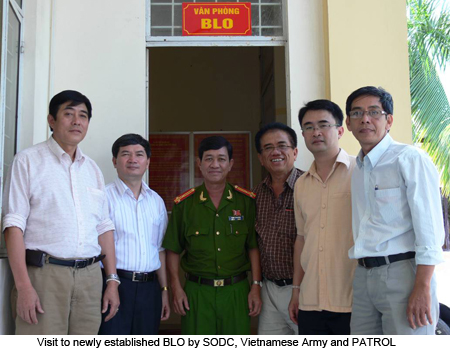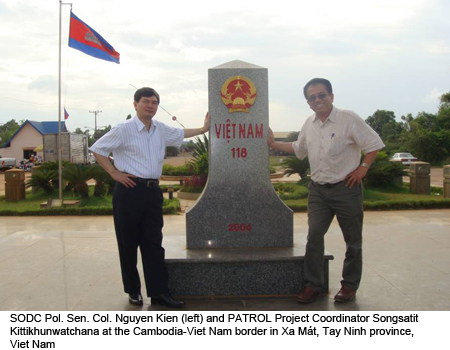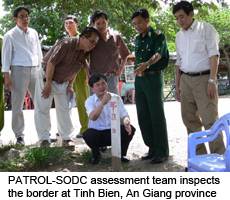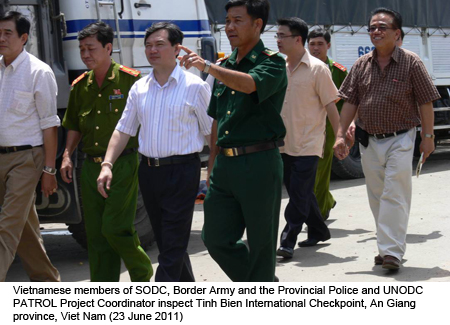PATROL Acts to Counter Border Crimes, Brings Hope to Victims of Human Trafficking

Tay Ninh and An Giang (Viet Nam), 27 July 2011 - A joint transnational assessment of organized border crime by the Partnership Against Transnational-crime through Regional Organized Law-enforcement
(PATROL) and the Standing Office on Drugs and Crime of Viet Nam (SODC) in the southern Viet Nam provinces of Tay Ninh and An Giang on 20-23 June 2011 found evidence of numerous organized criminal activities at two border crossings including the smuggling of migrants and illegal commodities, human trafficking, drug trafficking and environmental crimes.
Noting that the evidence of organized human trafficking, drug smuggling and environmental crimes underscored the critical importance of strengthened border liaison offices, Mr. Songsatit Kittikhunwatchana, UNODC PATROL Project Coordinator, said, "The newly established Border Liaison Offices or BLOs will play an important role in improving human security by fighting the organized criminal border activities that damage our environment and bring the darkness of drug addiction and human slavery into our midst."

Border officials at Xa Mát International Checkpoint in Tây Ninh province reported that thousands of Vietnamese cross the border into Cambodia daily to gamble, complicating efforts to control serious border crimes such as drug smuggling, human trafficking and immigration fraud.
Located across from Trapeang Phlong in Cambobia's eastern Kampong Cham province and a two-hour drive NW from Ho Chi Minh City, Xa Mát is allegedly used by organized criminals to smuggle women into Cambodia before selling them onwards to Singapore, Thailand, Malaysia and China. Typically, the trafficked women enter into a false marriage before sold to become sex or entertainment business workers abroad. In many cases, women voluntarily cross the border to work in casinos or karaoke parlours before being forced or sold to work as sex workers.
Drug trafficking is also a serious problem at Xa Mát, officials said, with 44 cases in the past six months of illegal drug involving 174 offenders and more than 50kg of mainly plant-based drugs from Cambodia.
 At Tinh Bien International Checkpoint in An Giang province, a nearly four-hour drive west of Ho Chi Minh city, border officials reported illegal smuggling of migrants by local brokers to work in rubber plantations and construction and the trafficking of Vietnamese women either to be sex workers in Cambodia or forcibly married to foreign men, often Chinese.
At Tinh Bien International Checkpoint in An Giang province, a nearly four-hour drive west of Ho Chi Minh city, border officials reported illegal smuggling of migrants by local brokers to work in rubber plantations and construction and the trafficking of Vietnamese women either to be sex workers in Cambodia or forcibly married to foreign men, often Chinese.
The PATROL assessment at Tinh Bien also found 129 cases in the last six months of environmental crimes including the importing of hazardous wastes, used computers and batteries, and improperly treated scrap metals.

"The new BLOs will contribute to prevent and interdict trafficking activities in these hot-spots" concluded Mr. Kittikhunwatchana "but we know that new offices and new equipment alone are not enough. This is why the PATROL team is planning to return here in a few weeks with a new training package, customized for their needs of the border officers."
Background of PATROL
PATROL was established in 2010 by the United Nations Office on Drugs and Crime (UNODC) Regional Centre for East Asia and the Pacific and its partners to improve border security at land borders, sea ports and airports in China and the ASEAN countries of the Greater Mekong Sub-region (Thailand, Myanmar, Laos, Cambodia and Viet Nam).
PATROL's objectives include establishing border liaison offices (BLOs) in Cambodia, Lao PDR, Thailand and Viet Nam and training BLO staff. and port control and airport specialist response units to fight cross-border crimes related to irregular migration, particularly the trafficking in human beings, wildlife, illicit drugs and materials dangerous to the environment.
Partner PATROL organizations are the UNODC Regional Office for Asia and the Pacific, the United Nations Environmental Programme (UNEP), TRAFFIC, and the Freeland Foundation. PATROL is funded by the Governments of Australia and the United States.


 At Tinh Bien International Checkpoint in An Giang province, a nearly four-hour drive west of Ho Chi Minh city, border officials reported illegal smuggling of migrants by local brokers to work in rubber plantations and construction and the trafficking of Vietnamese women either to be sex workers in Cambodia or forcibly married to foreign men, often Chinese.
At Tinh Bien International Checkpoint in An Giang province, a nearly four-hour drive west of Ho Chi Minh city, border officials reported illegal smuggling of migrants by local brokers to work in rubber plantations and construction and the trafficking of Vietnamese women either to be sex workers in Cambodia or forcibly married to foreign men, often Chinese.
